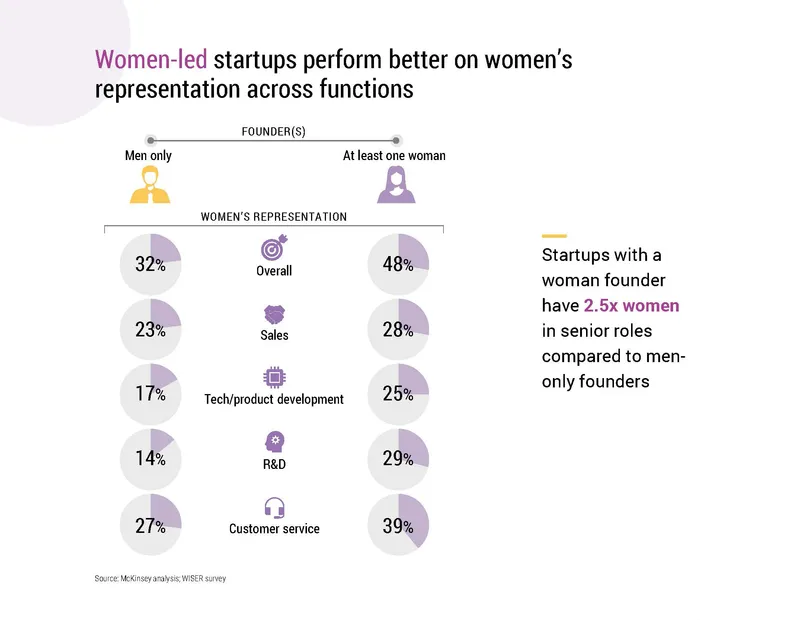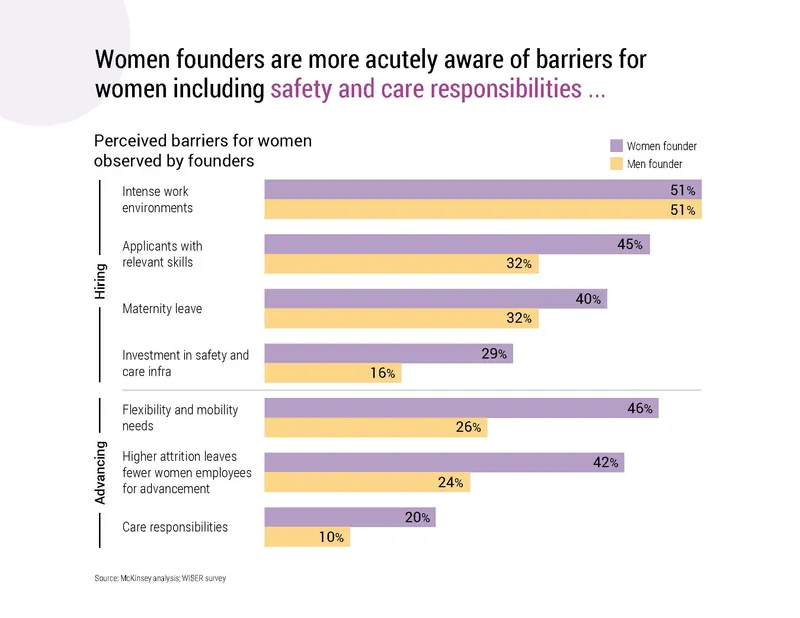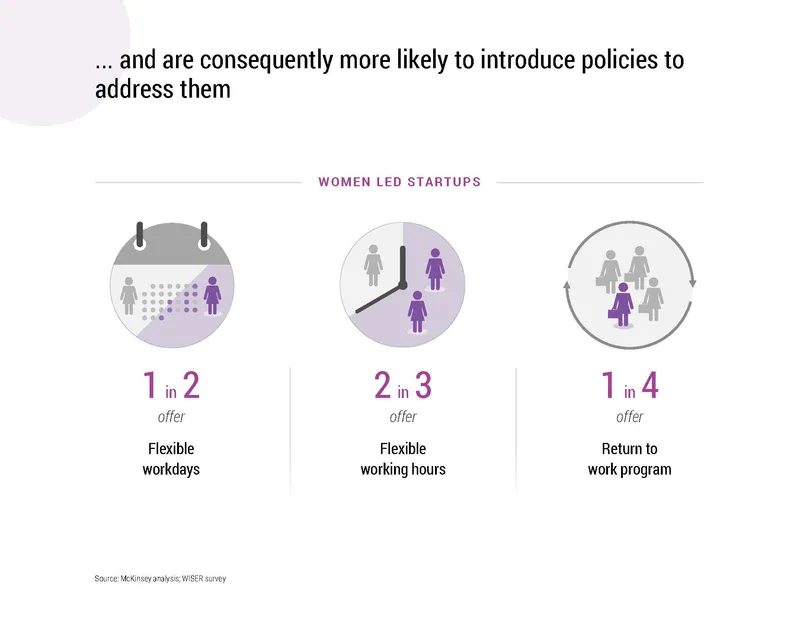Are women-led startups driving gender equity in the ecosystem?
Here’s a deep dive into how startups—women-led ones in particular—are fostering gender equity at the workplace and how women founders demonstrate understanding and empathy, helping women overcome barriers at the workplace.
Startups in India have the potential to create two million new jobs for women by 2030 and drive gender equity in the ecosystem, says a report by ACT For Women, in collaboration with The Udaiti Foundation.
The Women in India’s Startup Ecosystem Report (WISER), which reveals a number of interesting insights, points out that the startup ecosystem is uniquely positioned to attract female talent.
Women made up 35% of the startup workforce in 2022; with careful introspection that enables timely and targeted action, the startup community can raise this number to 50% by 2030, says the report.
The report, based on a survey of 200 startups across the country, indicates that startups have been pushing for greater representation of women in roles that were previously exclusively held by men.
For instance, participating startups reported that women had positions in key functions such as finance (36%) and sales (33%). On the other hand, corporates reported lower percentages of women in the same positions (21% and 19%, respectively).

Graph courtesy - ACT for Women's WISER Report
Gender equity forms a major focus of the report’s observations on the participation of women in the startup ecosystem.
According to the report, there are more women in senior roles in startups compared to corporates. Startups also demonstrate lower barriers for women to occupy roles across all functions.
Furthering the case of gender equity, the report says startups with a woman founder have 2.5x more women in senior roles, compared to startups with men-only founders.
Women founders are more acutely aware of the barriers for women, including safety and care responsibilities. Consequently, they are more likely to introduce policies to address them. Women-led startups also perform better on women’s representation across functions, the study reveals.
Aakanksha Gulati, Director, ACT For Women says, WISER has found that standalone programmes and DEI (diversity, equity, and inclusion) initiatives are not enough to drive gender equity. Gender equity has to be embedded in the culture of the organisation, she says.
“Startups that have been most successful in advancing gender equity are the ones that understand that an inclusive workplace culture alongside enabling practices, policies and people, together, are key to purposefully hiring, retaining and advancing women,” elaborates Gulati.
In light of the findings of the report, HerStory spoke to some women startup founders and co-founders to understand how they are fostering gender equity in their organisations with an inclusive workplace culture and diverse hiring practices. We also examine whether women-led startups demonstrate better understanding and empathy, leading to breaking down of barriers for women.
Creating inclusive workplaces

Priyanka Gill, Swati Bhargava, Mabel Chacko and Shreedha Singh
When it comes to women’s representation across functions and in leadership roles, startups believe in walking the talk.
Priyanka Gill, Co-founder of content-to-commerce company The Good Glamm Group and CEO, Good Media Co, says two-thirds of the company’s founders and a significant part of its leadership team are women, thus embodying inclusive leadership.
“About 60% of our workforce comprises women, showcasing our dedication to a balanced and diverse environment. We are proactively striving for increased representation of women in positions traditionally held by men,” says Gill.
To ensure inclusivity, particularly for women, The Good Glamm Group has instituted processes in team meetings wherein managers and leaders ensure everyone has an opportunity to express their thoughts.
Today, the Good Glamm Group has 350 women professionals in corporate roles and around 1,800 female employees in the retail sector.
Mabel Chacko, Co-founder & COO of neobanking unicorn startup, OPEN Financial Technologies, believes dedication to gender equity is not just about numbers but is also about fostering an environment where both men and women contribute to their fullest potential.
“In a span of 6.5 years, women have consistently held leadership positions right from the inception of OPEN. The inclusion of women in leadership roles from the early days has not only become a norm but is a defining characteristic of who we are as a company,” she says, adding that her organisation has several women in leadership roles across various departments, including marketing, people and culture, finance, design and development, sales, and tech.
Gender equity cannot remain a feel-good platitude, it has to reflect in the workplace ethics and practices of an organisation.
“In contrast to most corporates, where the percentage of women in leadership roles is often lower due to lack of support after marriage and motherhood, we at OPEN take deliberate steps to support our women colleagues, especially during their maternity period,” says Chacko.
Steps include work-from-home options for mothers who have recently had a baby and dedicated facilities for new mothers, including an in-house care room for them to feed their babies, and a separate nursery for small children who accompany their mothers to the office.
“This enables mothers to strike a better balance between their personal and professional lives,” says Chacko.
Flexibility is a key component of efforts to help women employees achieve productivity targets.
“At startups, the focus is on deliverables rather than traditional constraints like mandatory work hours, fixed schedules, or a specific corporate code. This approach translates to a more equitable workforce, allowing for greater flexibility and a results-driven environment,” says Shreedha Singh, Co-founder and CEO of The Ayurveda Company, which has over 800 employees, at a women-to-men workforce ratio of 65:35.
Evolving HR practices
HR practices at startups have evolved beyond traditional employee policies to embrace diverse metrics across the board—right from recruitment and performance evaluation to mentorship and more.
Chacko points out that OPEN’s recruitment approach revolves around fostering diversity at every stage of the hiring process.
“From crafting unbiased and inclusive job descriptions to cultivating gender-diverse candidate pipelines, our commitment to diversity is embedded in every stage of the hiring process.
“Moreover, we ensure diversity in our interview panels, spanning across all departments. This has proven instrumental in shaping a workplace that is not only diverse but is also equitable,” she says.
Gill says specific HR practices—such as unbiased recruitment processes, targeted mentorship programmes, and equal opportunities for professional development—are instrumental in promoting gender equity.
Ashwini (name changed), who works in a Bengaluru-based startup, echoes this sentiment.
“My startup offers a number of mentorship programmes that are specific for women. This has helped me aspire and work towards a leadership role in the organisation,” she says.
In addition to a number of women-friendly policies, cashback and coupons platform CashKaro incentivises diversity through a unique 'diversity bonus', provided on top of the referral bonus, encouraging the hiring of female employees through referrals and promoting a more inclusive workplace culture.
In a step forward, the Good Glamm Group has introduced a Gender Reassignment Policy to recognise the challenges of gender transition by offering essential healthcare benefits and resources to support individuals during the transition.
Role of women founders in steering gender equity

Graph courtesy: ACT for Women's WISER report
Startups led by women founders are keen to nurture an ethos that’s geared towards gender equity at every level of the organisation and create a conducive environment for women employees to voice their concerns and thoughts.
Gill believes women founders and leaders prioritise diversity and inclusivity as integral components of their organisational culture.
“This commitment often translates into proactive efforts to attract, retain, and promote women across various roles within the startup,” she says, adding that women founders also serve as inspirational figures for women employees.
Swati Bhargava, Co-founder of CashKaro, reiterates that women founders bring in a unique perspective and firsthand understanding of the barriers that women face, including safety concerns and caregiving responsibilities.
“This heightened awareness can lead to the implementation of policies and practices that specifically address these challenges, creating a more inclusive and supportive environment,” she says.
Mangala Ramamoorthy, who works as a communication ninja with Unlock Impact, a social impact venture, feels that, as a working mother with different, and sometimes unpredictable, personal priorities, there is a sense of ease when she communicates with her two women founders.
“I joined the organisation at a time when my home required more attention but, at the same time, I wanted to continue to contribute professionally. I have been able to keep that balance comfortably at Unlock Impact.
“There are open discussions on mental health, motherhood challenges, and challenges of being a caregiver to a loved one. And these conversations can happen without having to second guess ourselves,” she says.
Abhishek Lakhera, who works in a women-led consultancy organisation, believes working for women helps men to be more inclusive in their thought process and gives them a more diverse outlook.
“Women are much better at soft skills than men, and it’s a trait all men can learn from them,” he says.

The case for women-led startups: Graph courtesy - ACT for Women's WISER report
Empathy and understanding
Women leaders also tend to be more empathetic because they understand the specific challenges and responsibilities faced by other women, says Chacko.
“Embracing varied viewpoints, especially those influenced by gender experiences, significantly enhances our ability to tackle challenges with a deeper understanding and make decisions that reflect empathy,” she says.
“While there is no compromise on professionalism and work, there is a clear sense of balance that is driven by empathy and understanding of how life works—be it setting expectations with the client or trying to maximise flexibility for women professionals. Women founders lead by example with their openness and honesty,” says Ramamoorthy of Unlock Impact.
Levelling the playing field for women
When Gill was raising funds for her startup POPxo, she reveals that she encountered biased queries in pitch meetings. So, she knows what it is to battle gender-linked bias and is eager to lend a helping hand to women entrepreneurs.
Two years ago, she was invited by Vani Kola, Managing Director of Kalaari Capital, to join CXXO—an initiative launched by Kalaari Capital to help female founder-CEOs by investing in their startups and building a network of capital, coaching and community.
Gill is a founding board member at CXXO, alongside Kola and other women leaders such as Shradha Sharma of YourStory, Lathika Pai, and Paroma Roy, and a network of champions.
“We want to #LevelThePlayingField for female founder-CEOs,” says Gill.
(Feature image: Nihar Apte)
Edited by Swetha Kannan







